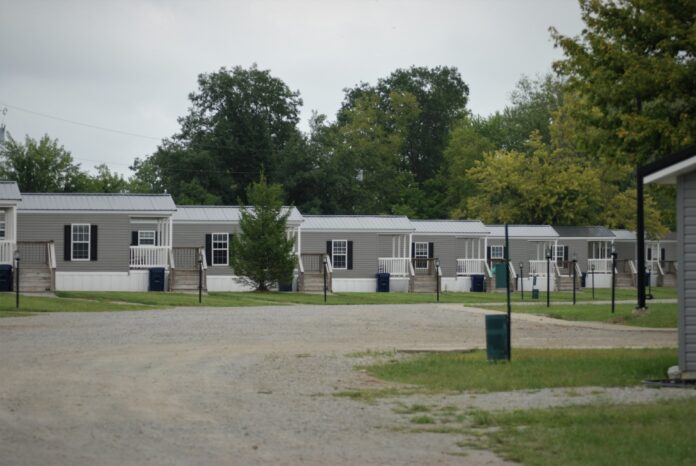Mobile homes, also known as manufactured homes, are a type of housing that is designed and constructed in a factory before being transported to a specific location for installation. They are called “mobile” homes because they are built on a chassis with wheels, making them movable and transportable. Mobile homes have become increasingly popular over the years due to their affordability, flexibility, and the ability to provide housing in various locations. In this comprehensive overview, I will cover the key aspects of mobile homes, including their history, construction, regulations, benefits, and considerations.
Mobile homes have a rich history that dates back to the early 20th century. They were initially introduced as trailers and were primarily used as temporary accommodations or housing for travelers. However, over time, the design and construction of mobile homes evolved, and they became a viable option for permanent housing as well. In the United States, mobile homes gained significant popularity after World War II, as they provided affordable housing solutions for the growing population.
Today, mobile homes are built in specialized factories using advanced manufacturing techniques. The construction process follows strict guidelines and standards to ensure durability, safety, and energy efficiency. Mobile homes are typically constructed using lightweight materials that are both cost-effective and able to withstand transportation. The sections or modules of a mobile home are built separately in the factory and then transported to the desired location, where they are assembled and secured on a permanent foundation.
It’s important to note that mobile homes are subject to specific regulations and codes to ensure the safety and quality of the housing. These regulations vary by country and region, but they typically cover aspects such as design, construction, transportation, installation, and maintenance. It is essential to familiarize yourself with the local regulations and requirements before purchasing or installing a mobile home.
Now, let’s delve into the five important things you need to consider when it comes to mobile homes:
1. Affordability: One of the primary advantages of mobile homes is their affordability compared to traditional site-built houses. Mobile homes are generally more cost-effective, making them an attractive option for individuals and families with limited budgets. The lower price point allows more people to become homeowners and provides an opportunity for financial stability and independence.
2. Flexibility and Mobility: As the name suggests, mobile homes offer flexibility and mobility. They can be transported and relocated to different areas, allowing homeowners to change their residence without the need to sell or buy a new property. This mobility is particularly beneficial for individuals who have jobs that require frequent relocation or for those who simply enjoy the freedom to move as they desire.
3. Customization Options: Mobile homes come in various sizes and designs, offering a range of customization options. Manufacturers provide a selection of floor plans, finishes, and features, allowing homeowners to personalize their living space according to their preferences and needs. From choosing the layout of rooms to selecting appliances and finishes, customization options make mobile homes a versatile housing solution.
4. Energy Efficiency: Modern mobile homes are designed with energy efficiency in mind. They often incorporate energy-saving features such as insulation, high-quality windows, and energy-efficient appliances. These design elements help reduce energy consumption, lower utility bills, and contribute to a more environmentally friendly living environment. When purchasing a mobile home, it’s essential to inquire about its energy efficiency rating and look for certifications such as ENERGY STAR to ensure optimal energy performance.
5. Community Living: Many mobile home communities exist across the country, offering a unique social environment for residents. These communities often provide shared amenities and recreational facilities, fostering a sense of belonging and camaraderie among homeowners. Living in a mobile home community can be particularly appealing for those seeking a tight-knit neighborhood and the opportunity to engage in various activities and events.
Mobile Home Financing: Financing options for mobile homes can differ from those available for traditional site-built houses. It is essential to research and understand the financing options specific to mobile homes. Some lenders specialize in mobile home loans, and government-backed programs like the Federal Housing Administration (FHA) and the Department of Veterans Affairs (VA) also offer loan programs for mobile homes. Exploring these options can help you secure affordable financing for your mobile home purchase.
Maintenance and Upkeep: Like any other property, mobile homes require regular maintenance to ensure their longevity and structural integrity. It is important to understand the maintenance requirements specific to mobile homes, such as checking the roof for leaks, inspecting the underbelly for any issues, maintaining the HVAC system, and keeping the plumbing in good condition. Regular maintenance and prompt repairs can help preserve the value of your mobile home and ensure a comfortable living environment.
Resale Value: Mobile homes, like any other form of housing, have a resale value. While mobile homes tend to depreciate in value over time, factors such as location, condition, age, and the desirability of the community can impact their resale value. It is important to consider the potential resale value when purchasing a mobile home, especially if you anticipate moving or upgrading in the future.
Zoning and Land Use Regulations: Mobile homes are subject to zoning and land use regulations, which vary depending on the jurisdiction. These regulations govern where you can place a mobile home and the type of land it can be situated on. It is crucial to research local zoning laws and land use regulations to ensure compliance and avoid potential legal issues. Some areas have specific zones dedicated to mobile homes, while others may restrict their placement to designated mobile home parks or communities.
Insurance Considerations: Insuring a mobile home is an important aspect of homeownership. Mobile home insurance provides coverage for the structure, personal belongings, and liability protection. When choosing an insurance policy, it is essential to carefully review the coverage limits, deductibles, and exclusions. Additionally, some mobile home communities may require specific insurance coverage as part of their regulations. Obtaining the right insurance coverage will provide you with peace of mind and financial protection in the event of unforeseen circumstances.
Mobile homes offer a range of advantages, but it is crucial to consider these important factors to make an informed decision. Affordability, flexibility, customization options, energy efficiency, and community living are key benefits that make mobile homes an attractive housing option. Understanding financing options, maintenance requirements, resale value, zoning and land use regulations, and insurance considerations will help you navigate the process of purchasing, living in, and maintaining a mobile home successfully. Whether you choose a mobile home as a permanent residence or a temporary housing solution, thorough research and careful consideration of these factors will contribute to a positive and fulfilling mobile home ownership experience.
Mobile homes, also known as manufactured homes, are a type of housing that is designed and constructed in a factory before being transported to a specific location for installation. Mobile homes are called “mobile” homes because they are built on a chassis with wheels, making them movable and transportable. Mobile homes have gained popularity over the years due to their affordability, flexibility, and the ability to provide housing in various locations.
Mobile homes have a rich history that dates back to the early 20th century. The concept of mobile homes began with trailers, which were primarily used as temporary accommodations or housing for travelers. These early mobile homes were basic structures built on wheels that could be towed behind a vehicle. Over time, the design and construction of mobile homes evolved, and they became a viable option for permanent housing as well.
In the United States, mobile homes gained significant popularity after World War II. The post-war era saw a surge in the demand for affordable housing, and mobile homes provided a solution. Manufacturers started producing mobile homes on a larger scale, incorporating innovations in design and construction techniques. This led to the establishment of mobile home communities and parks, where mobile homes could be permanently placed and connected to utilities.
Today, mobile homes are built in specialized factories using advanced manufacturing techniques. The construction process follows strict guidelines and standards to ensure durability, safety, and energy efficiency. Mobile homes are typically constructed using lightweight materials that are both cost-effective and able to withstand transportation. The sections or modules of a mobile home are built separately in the factory and then transported to the desired location, where they are assembled and secured on a permanent foundation.
Mobile homes offer several advantages that make them an attractive housing option for many individuals and families. One of the primary advantages of mobile homes is their affordability compared to traditional site-built houses. Mobile homes are generally more cost-effective, making them accessible to a wider range of people. The lower price point allows more people to become homeowners and provides an opportunity for financial stability and independence.
In addition to affordability, mobile homes offer flexibility and mobility. The ability to transport and relocate a mobile home is a significant advantage. Mobile homes can be moved to different areas, allowing homeowners to change their residence without the need to sell or buy a new property. This mobility is particularly beneficial for individuals who have jobs that require frequent relocation or for those who simply enjoy the freedom to move as they desire.
Customization options are another appealing aspect of mobile homes. Manufacturers provide a selection of floor plans, finishes, and features, allowing homeowners to personalize their living space according to their preferences and needs. From choosing the layout of rooms to selecting appliances and finishes, customization options make mobile homes a versatile housing solution.
Mobile homes have also seen advancements in energy efficiency. Modern mobile homes are designed with energy efficiency in mind. They often incorporate energy-saving features such as insulation, high-quality windows, and energy-efficient appliances. These design elements help reduce energy consumption, lower utility bills, and contribute to a more environmentally friendly living environment. When purchasing a mobile home, it’s essential to inquire about its energy efficiency rating and look for certifications such as ENERGY STAR to ensure optimal energy performance.
Another significant aspect of mobile home living is the sense of community. Many mobile home communities exist across the country, offering a unique social environment for residents. These communities often provide shared amenities and recreational facilities, fostering a sense of belonging and camaraderie among homeowners. Living in a mobile home community can be particularly appealing for those seeking a tight-knit neighborhood and the opportunity to engage in various activities and events.
While mobile homes offer numerous benefits, it’s important to consider certain factors when choosing this type of housing. Financing options for mobile homes can differ from those available for traditional site-built houses.






















